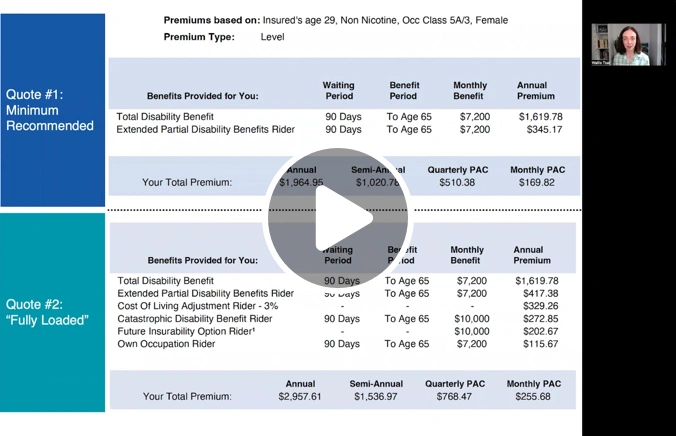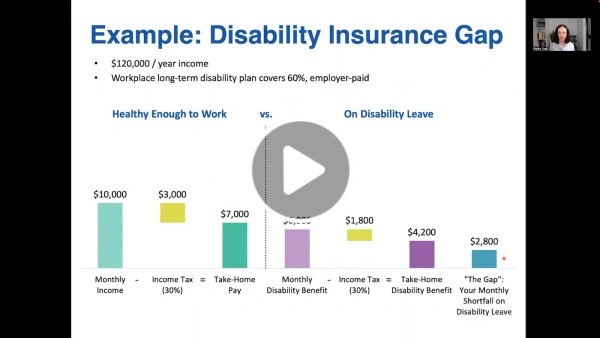COVID-19 has created a ton of interest in life and disability insurance. We’re confronted daily with news of death and sickness, and our upended daily experience reminds us of how fragile “normal life” can be. (I live in NYC, my spouse and I both work full-time in normal times, and our kids are 4 and 6 years old, both doing remote learning—“upended” is putting it mildly.)
Understandably, people have a lot of questions about how getting coverage works in a global pandemic.
The good news is that the industry is open and operating, and many carriers have responded to this public health crisis by increasing options to get coverage in a physically-distanced, COVID-19-safe way.
Here at AboveBoard, we help clients find carriers that best fit their needs—including COVID-19 safety precautions—and we wanted to share our tips with you and answer some commonly asked questions.
Q: Have life insurance prices gone up?
***December 2020 update: some carriers have raised prices, and more will likely continue to do so. Our expectation is that prices will not go back down anytime soon.
Short answer: No, prices haven’t gone up yet, but now is a great time to get coverage if it’s a lingering item on your to-do list, because there’s a good chance they will.
Slightly longer answer: Insurance pricing is not like the stock market, where prices can fluctuate wildly, based on perceptions of risk. Insurance prices have to be filed with the state regulator, which means that price changes take time to go into effect. We have seen activity indicating prices will go up in the future (e.g., some carriers pulling some products from the market, with the intent of repricing).
Q: Do I need to get a paramedical exam (blood draw, etc.)?
The insurance industry has responded to COVID-19 by expanding the ways you can apply for low-priced coverage without a paramedical exam.
There are different COVID-19-adjusted application programs being offered by different carriers, but here’s a sampling of common components of application processes (which ones and how many you’re asked to do depends on what you’re applying for and through which carrier):
- You authorize the insurance carrier to check databases, such as your prescription drug records, driving record, etc.
- You do a video interview and provide health information to a trained interviewer
- You electronically connect your medical records to the carrier so they can evaluate your insurance application (this works if you have an online patient portal—think Mint for health records)
- You provide results from an annual physical or other doctor’s appointment in lieu of a paramedical exam (download a pdf from your patient portal, etc.)
***December 2020 update: there are still some programs available to avoid the paramedical exam, but these are becoming less common as the industry has adjusted to working within the restrictions of COVID-19. Paramedical examiners now show up wearing masks, face shields, and clothing covering their arms and legs in addition to the usual gloves for taking your blood pressure or drawing blood samples. Examiners have been uniformly excellent about working with applicants to accommodate COVID-19 safety precautions, such as doing the exam in an outdoor space or a garage with the door open.
Here at AboveBoard we help match you with the carrier that best fits your needs, and that now includes COVID-19 safety.
There are a number of situations where it’s very clear-cut that someone can apply using one or more of the above strategies. In other situations, it’s at the carrier’s discretion if they will accept the alternative documentation. To assist clients in getting through, we submit a cover letter that provides extra context for your request—think of it as an injection of humanity into the process. That’s part of our role of advocating for you!
Q: I would only get covered if I knew I could avoid a paramedical exam. What should I do?
Get an instant online quote for life insurance or a disability insurance quote at AboveBoard, and one of our experts will review and advise you on your best COVID-19-safe insurance coverage strategy. We are tracking the changing landscape of options and can help guide you to attractively priced coverage that you’re comfortable applying for during a global pandemic.
Working with multiple carriers empowers us to make sure that any particular carrier isn’t the final say on a client’s options. If, during the application process, we get an answer we don’t like, we can go back into the market and look for your best option. We handle the legwork for you.
Q: I have some medically complex issues. Can I still get covered?
A number of carriers are still open to insuring people with a significant health condition (or several) in their profile. Other carriers have temporarily pulled back from writing new policies for “table-rated” individuals.
Being table-rated does not mean sick—most people who are table-rated are living healthy, normal lives and are table-rated due to a particular diagnosis that does not define them.
If you have a more complex profile, we have a special process that susses out your best option in the market. It’s anonymous and free, so it’s a great way to find out what your options really are.
If we find that your would-be best carrier has temporarily restricted their coverage choices, we can advise you on smart strategies for getting something in place during the pandemic. Then you can try for coverage you’ll like even better after things get back to normal, assuming that your health profile is similar at a later date.
The worst-case, “Armageddon” scenario for your family is obviously that you die or become sick while waiting for better coverage to be available to you. That’s not an acceptable risk. Instead, you can make a trade off to meet budget goals while you wait for your ideal coverage. Say your youngest child is 2 years old, and you plan to retire in ~30 years. You’d like $2 million 30 year term coverage, ideally. As a trade off, we might suggest you instead take out $2 million of 20 year term coverage from your 2nd-choice carrier to get your kids through college, with a plan to try for 30 year coverage once we’re approaching normal again. The best time to get covered is now.
Q: I have COVID-19—can I get coverage?
Unfortunately someone who currently has COVID-19 is not eligible for coverage. You would need to recover fully before getting coverage is a possibility for you.
***December 2020 update: some carriers are open to offering coverage to people who have fully recovered from COVID-19. Some are even open to considering these applicants as if they never had COVID-19, meaning that if they qualified for Best-tier pricing before, they are still eligible for it. Other carriers are imposing a surcharge on COVID-19 survivors.
Q: I don’t have COVID-19, but I’m really worried about it. I want coverage ASAP— what should I do?
Optimizing for speed to completion is a goal that some clients have, and we can help you with that. Just tell us that’s what you want, so we can focus on the best options to meet that goal. Oftentimes, it’s just a matter of picking the right carrier, and we’ll always be transparent about the trade-offs. For example, is the fastest option also the least expensive option? If not, how much more does this convenience and peace of mind cost?
We’ll also advise you on where you can make choices to optimize for speed. For example, say you determine that ideally you’d like $2.6 million of 30 year term coverage. Since you told us you wanted to get covered ASAP, we’d be sure to tell you if there’s a great speed-focused application process available for up to $2.5 million. Again, trade-offs are OK.
This is an unusual (and often stressful) time for all of us—here at AboveBoard we’re proud of the work we’ve done to continue advocating for our clients’ best interests, and we would be happy to help you get the coverage you need.





